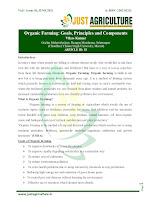Cell Division
Cell is the basic structural and functional unit of all living organisms. The process reproduction or formation of new cells from pre-existing cells is referred to as Cell Division.
- The term mitosis was coined by Flemming in 1882.
- Mitosis refers to the spindle using nuclear division which produces two identical daughter nuclei from the parent nucleus.
- Mitosis leads to production of two daughter cells from a mother cell in each cycle of cell division.
- The daughter cells are similar to mother cell in shape, size and chromosome complement.
- Mitosis takes place in somatic organs and it leads to growth of vegetative parts.
- Segregation and recombination do not occur during mitosis.
- It is also known as equational division.
Cell cycle
The time period in which one cycle of cell division is completed is called Cell Cycle.
Cell cycle has two phases:-
A. Interphase
A. Interphase:
It is the longest stage of cell cycle. Generally known as DNA synthesis phase. Interphase is further divided into three stages
(a). G1 phase
(b). S phase
(c). G2 phase
(a). G1 phase
It is pre-DNA replication phase. Protein & RNA synthesis takes place during this phase. It is the longest phase of interphase.
(b). S-phase
The chromosome and DNA replications take place during this phase. Amount of DNA is became double during this phase.
(c). G2 phase
Post-DNA replication phase. This is the last stage of interphase.
B. Mitotic phase:- Mitotic phase leads to separation of replicated DNA into two daughter nuclei without recombination reply have the same chromosome number without recombination.
Mitotic phase is further divided in four parts:-
1. Prophase
- Chromosome look like in thread and uncoiled in early prophase.
- Chromosome becomes coild and more distinct during mid prophase.
- In late prophase chromosomes become more conspicuous, short, thick and longitudinally double.
- Every chromosome hold two chromatids at thier centromere.
- Nuclear membrane and nucleolus disappear at the end of prophase.
2. Metaphase
- Spindle tubes are formed and chromosomes are oriented on equatorial plate.
- Chromosomes are attached to the spindle tubes at the centromere.
- Chromosomes are clearly visible at metaphase.
- Sister chromatids of each chromosome are joined together at the point of centromere but their arms are free.
3. Anaphase
- Chromatids separate from the centromere and move towards opposite side of pole.
- Chromatids of each chromosome become free at the centromere point.
- These free chromatids move apart one goes to one pole and another goes the other pole.
- After separation of the each chromatid, became a new chromosome.
4. Telophase
- After anaphase stage spindle tubes disintegrate.
- A new nuclear membrane form at each pole covering chromosome.
- Nucleolus reappear at each pole.
- Chromosome become thinner and longer.
C. Cytokinesis
- The division of nucleus is known as karyokinesis.
- The division of cytoplasm is known as cytokinensis.
- Cell plate form in the centre of the cell and the division of the cytoplasm occurs.
- In animals separation of cytoplasm starts by furrowing the plasmalemma in equatorial region.
Significance of Mitosis
- Mitosis is responsible for the development of a child got into an adult organism.
- Mitosis is essential for normal normal growth and development of living organisms.
- Mitosis helps in sexual propagation in case of vegetatively propagated crops like sugarcane potato etc.
Note:- All the pictures included in the blog have been taken from the various internet sources. All the right of the pictures are secured to their owners. Pictures are only used here for the fair use of content for educatioal purpose.
Thank You
Vikas Kashyap:)


















0 Comments